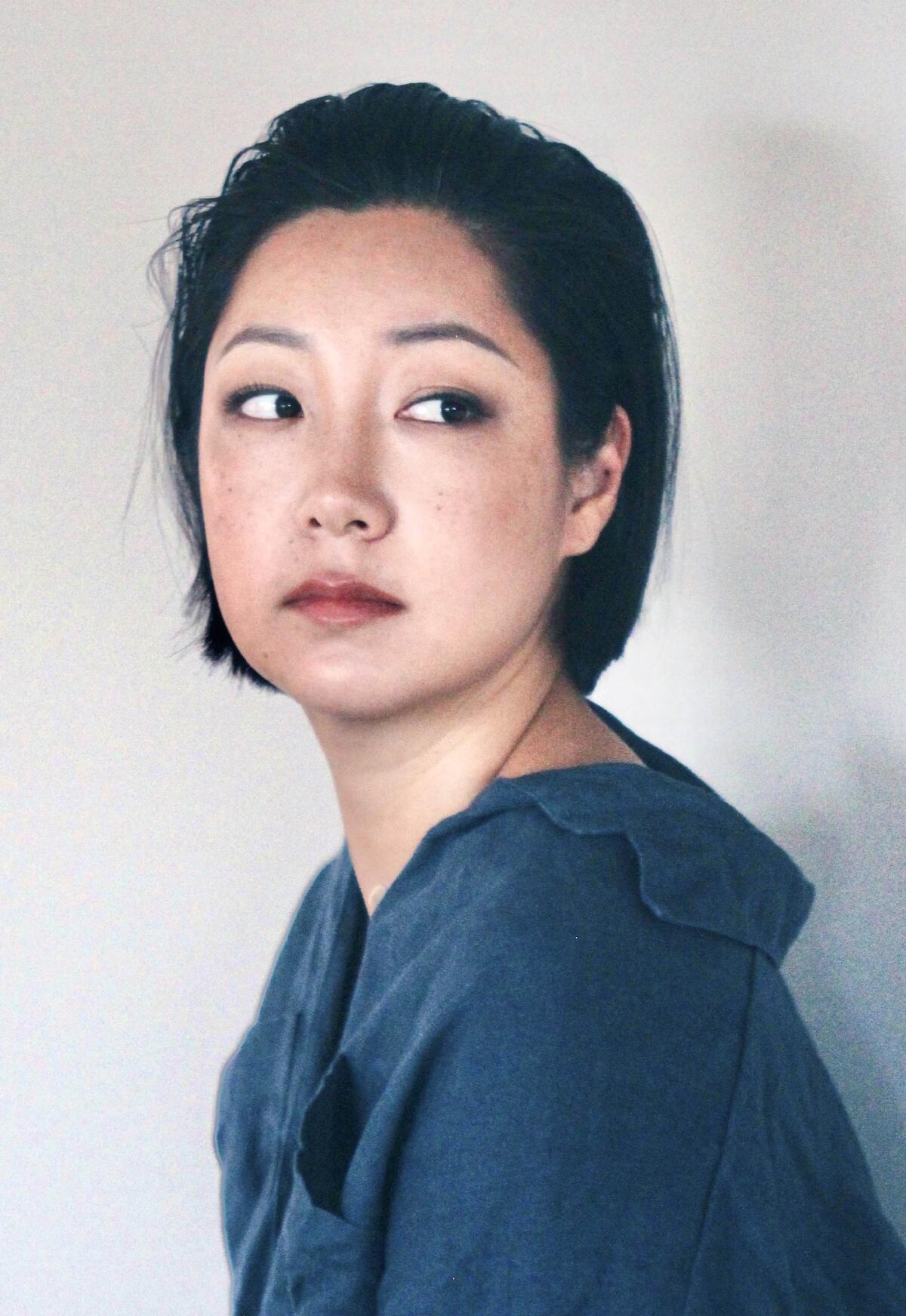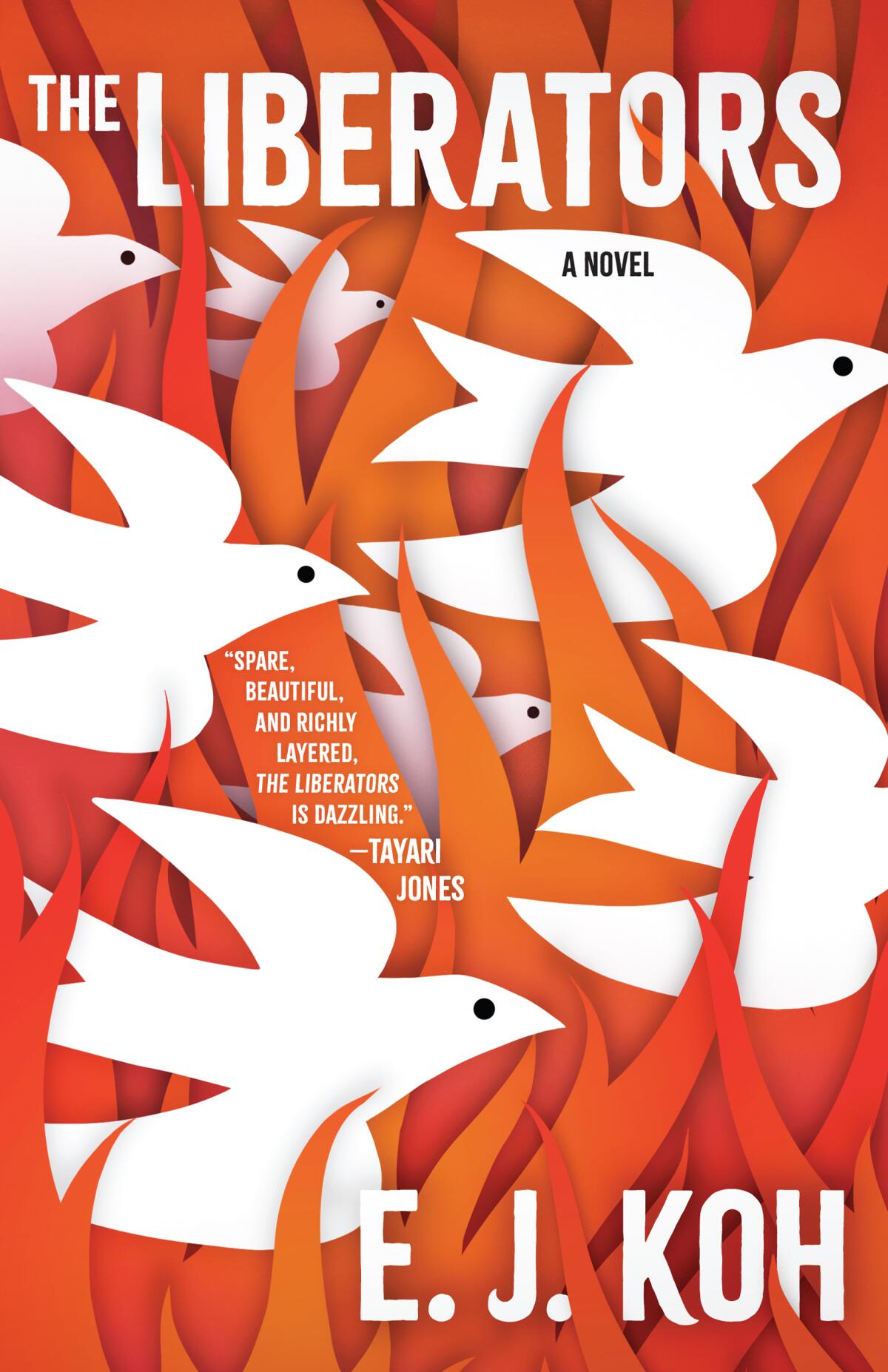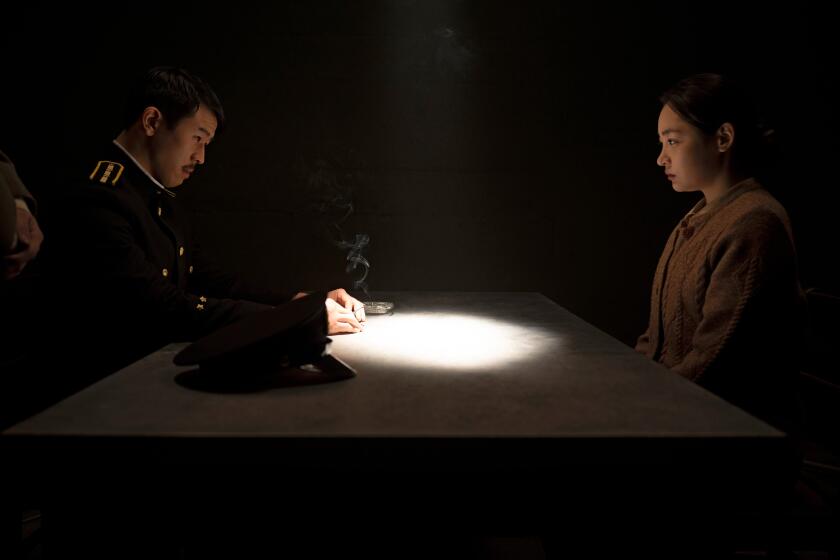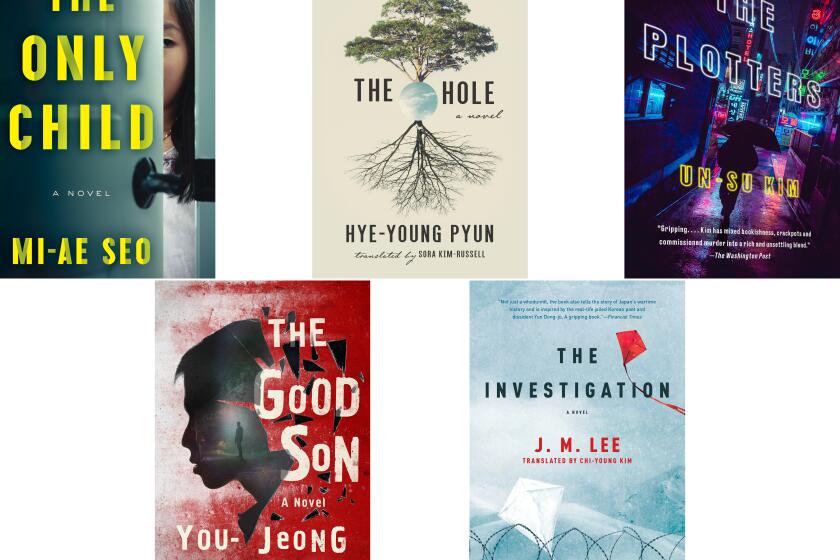In this Korean immigrant saga, California is no escape from brutal battles back home

- Share via
Review
The Liberators
By E.J. Koh
Tin House: 240 pages, $28
If you buy books linked on our site, The Times may earn a commission from Bookshop.org, whose fees support independent bookstores.
E. J. Koh’s debut novel, “The Liberators,” opens with joy followed immediately by grief. Yohan, a man living in Daejeon, South Korea, in 1980, recalls the importance of writing in his childhood. He would use anything at hand to trace the shapes of letters and characters, spelling out words for the sheer pleasure of it. “At some point,” he narrates on the book’s opening page, “my mother set me down and didn’t pick me up again. On my mother’s grave, I wrote grave.”
This kind of transition — from the idea that every growing child will eventually stop being picked up by a parent to the understanding that tragedy has struck — is typical of the novel, which manages to convey sweeping changes and painful events in families and nations through condensed, often lyrical language. In just over 200 pages, “The Liberators” covers more than 30 years of a family’s life, not counting flashbacks, and explores how the past travels with us, and how we may find solace amid loss through relationships with others.
Showrunner Soo Hugh and directors Justin Chon and Kogonada find the personal amid the story’s sweeping scope
Yohan’s grief continues beyond the death of his mother. Following the Japanese surrender, the U.S. and the Soviet Union split Korea up “as spoils of war.” Yohan joins the military when he’s 15, and the Korean War leaves him no longer filled with words but instead “made of silence.” Still, he manages to go through the motions: He marries, has a daughter and seems to have a prosperous career. His wife dies when Yohan is in his mid-40s, and he worries about finding his daughter, Insuk, a husband.

Insuk, in her early 20s, has already found someone. She and Sungho met in their first year of university, and they’ve already decided to marry. Insuk admires Sungho’s intelligence but wishes he’d be more politically proactive. When her father, Yohan, goes missing, she becomes even more frustrated with what she sees as Sungho’s passivity, but he astutely notes the emotional stakes at play: “If they found her father dead, it’d be terrible for Sungho to be the one who was alive. It would be as if he’d killed her father himself.”
“The Liberators” follows these characters across the years. Insuk and Sungho marry; move to San Jose, Calif., with Sungho’s mother, Huran; have a child named Henry; and move to Tacoma, Wash. But this kaleidoscopic novel never stays within the borders of a tidy family plot. Koh delves into the perspectives of characters both tangentially and intimately related to the family, from the guard who oversees Yohan’s torture to a middle-aged businessman and activist for Korean reunification, showing how being witnessed by others is vital at one’s best and worst. All the while, Koh threads contemporaneous and historic events in Korea into the background.
Nancy Jooyoun Kim’s first novel, “The Last Story of Mina Lee,” follows an assimilated daughter solving the puzzle of her Korean mother and her own identity.
The period of martial law in South Korea and the ensuing nationwide student protests underlie many chapters in Part 1, “Invisible Lines: 1980-1983.” Yohan, watching a state-censored news broadcast, sees protesters being lined up and a military brigade raising rifles: “I recognized the slight movement before the stillness of their aim,” he narrates, his own military background giving him insight into their rigid stances, the smoky scent of their skin and uniforms, the way their trigger fingers relax into movement. He also recognizes one of the students as a son of an employee.
“Their eyes dilated as they emptied their cartridges of bullets into the students. ... My employee’s youngest … looked toward the sky and shook as if his body were a garment on a clothesline.” What Yohan is witnessing is probably the start of the Gwangju Uprising of May 1980, also known as the Gwangju Massacre: Students at Chonnam National University, protesting the recent military coup d’état, were shot and killed by the South Korean military.
Immigrants and their children will recognize the dynamics of the family at the center of Koh’s novel. Their lives in the U.S. continue apace: Sungho works hard; his mother, Huran, nags on the one hand but desperately needs her daughter-in-law on the other; the family eventually moves from a one-room rental to a townhouse, adopts a dog, socializes with other Korean immigrants. But they are always aware of what’s going on at home as well as the histories that have shaped them, from specific memories of their parents to large-scale events like the Ukishima Maru disaster of 1945, in which thousands of Koreans being repatriated from Japan died in an explosion many believe was planned by the Japanese imperial government.
A knowledge of this history is helpful but not required before reading Koh’s novel, which is flush with careful details, small moments of tenderness and surprising connections. The division and potential reunification of Korea are both reflected in these unexpected relationships. Mother- and daughter-in-law Huran and Insuk, for instance, share a bond that transcends their prescribed roles. Sungho heads to the U.S. first, leaving the women to live alone together throughout Insuk’s pregnancy. They work on a farm where Huran runs the chicken coops and rents a space to slaughter and sell the poultry to a restaurant.
Five authors of Korean thrillers you should be reading: You-Jeong Jeong, Un-Su Kim, Young-Ha Kim, J.M. Lee and Hye-Young Pyun
“With Sungho gone,” Insuk narrates, “I suspect we’ve become closer than we would have otherwise. We live in such close proximity she knows I have to pee by looking at me.” After years of often contentious living in the United States, the women come back together in Huran’s old age, Insuk caring for her in the hospital while Huran imagines a different life: “Suppose it was just Huran and Insuk, and Sungho had left them alone. Suppose Huran and Insuk had sold the hanbok and bought the farm and spent the days killing chickens in their aprons and the nights curling into each other’s arms by the stove. Huran understood it’d always been them, together.”
Who are the eponymous liberators of Koh’s debut? Not governments, not militaries, not systems of power. Instead, they are the individuals who find one another despite their apparent differences — North and South; young and old; human and animal — and free themselves through loving others and discovering that hope lives not in new lands or borders, but in the glory of relationships.
Masad is a books and culture critic and author of “All My Mother’s Lovers.”
More to Read
Sign up for our Book Club newsletter
Get the latest news, events and more from the Los Angeles Times Book Club, and help us get L.A. reading and talking.
You may occasionally receive promotional content from the Los Angeles Times.












